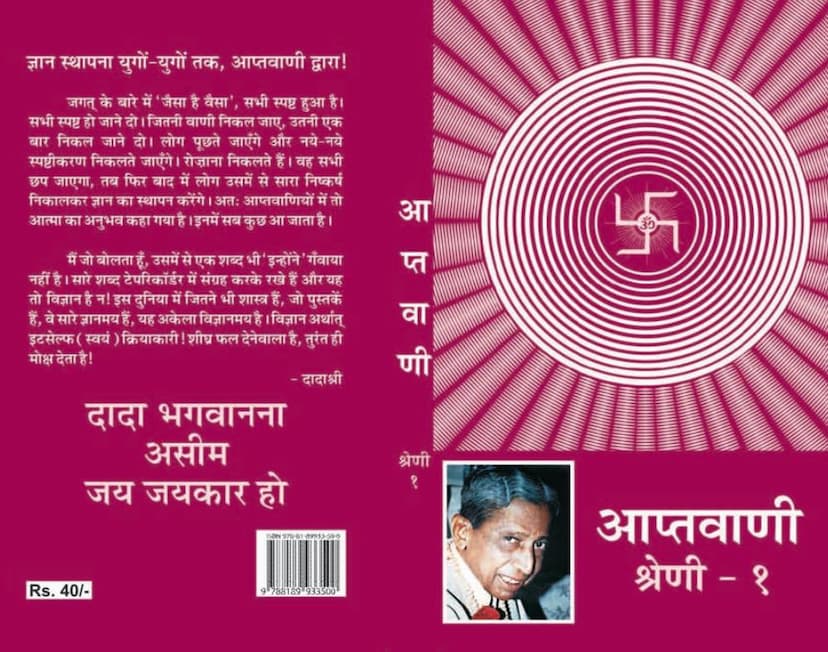Aptavani 01
Added to library: September 1, 2025

Summary
Here's a comprehensive summary of "Aptavani 01" by Dada Bhagwan, based on the provided text:
Overall Purpose and Nature of the Book:
"Aptavani 01" is the first in a series of spiritual discourses by Dada Bhagwan, a Gnani Purush (Enlightened Being). The core of this book is the experiential knowledge of the Self (Atma) and the nature of the world as it truly is. Dada Bhagwan's teachings are presented as a direct, practical science that leads to immediate liberation (Moksha). Unlike traditional scriptures, this knowledge is described as "science-based" and "action-oriented," yielding quick results.
Key Concepts and Teachings:
- The Nature of Dada Bhagwan: The book clarifies that the physical form perceived as Dada Bhagwan is actually "A.M. Patel," a Gnani Purush. The "Dada Bhagwan" within is the fully manifested Self, the Lord of the fourteen worlds, residing within all beings, including the reader. Dada Bhagwan refers to this inner Self respectfully.
- Akram Marg (Non-sequential Path): Dada Bhagwan's path to Self-realization is described as "Akram" – a shortcut, like a lift, bypassing the step-by-step climb of traditional spiritual paths. This knowledge is imparted directly, enabling one to experience the Self within just a few hours.
- Self-Realization (Atma-Gyan): The central theme is the attainment of Self-knowledge, enabling one to live in the world while remaining free and experiencing inner bliss. The book emphasizes that while the "Aptavanis" (words of the enlightened) provide guidance, direct Self-realization from a living Gnani Purush is essential.
- The Nature of Reality:
- The World is a Puzzle: The world is not created by an external God but is a self-existent puzzle. Understanding this puzzle leads to the Soul-Absolute (Paramatma) state.
- Vyavasthit Shakti (The Scientific Circumstantial Evidence): The world operates through a self-regulating cosmic principle called "Vyavasthit Shakti." This power manages everything naturally and scientifically, without a controlling entity. There is no external creator God.
- Nirakari (Formless) and Sakari (With Form): The Divine is both formless and present in all forms. Dada Bhagwan's physical body is a packing, while the real divinity resides within.
- Identification and Qualities of a Gnani Purush:
- Vitraga Vani: The primary way to recognize a Gnani is through their pure, non-attached speech.
- Four Main Qualities: A Gnani possesses immense compassion, inner stability (unwavering even amidst extreme circumstances), brilliance like the sun, and gentleness like the moon. They are profound like the ocean and stable like Mount Meru.
- Innocence: A Gnani possesses child-like innocence, not due to ignorance, but from absolute understanding and purity of vision.
- Non-Absolutism: They are completely impartial, not taking sides, and their speech, behavior, and humility are unparalleled.
- No Attachment: They are free from pride, attachment to worldly pleasures, and are not beggars for praise, wealth, or disciples.
- Beyond Intellect: They are "abudh" (beyond intellect) and hence "sarvajna" (all-knowing). True knowledge arises when intellect ceases to operate.
- No Grievances: They do not harbor ill will and their every action is a divine deed, leading to liberation, not bondage.
- No Vairagya: They have no need for renunciation as they are already detached.
- Impersonal: They remain aware of the Self, separate from the body, mind, and speech.
- Unique Attributes: They possess qualities like being "compressible," "flexible," and "tensile," enabling them to navigate life's challenges with ease.
- Moksha (Liberation): Moksha is achievable in this lifetime, even while living a worldly life, fulfilling responsibilities, and experiencing inner peace. It's about experiencing complete freedom, with no external controller ("upari") or internal subservience ("underhand").
- Dharm (Religion): True religion is the inherent nature (Swadharma) of a being. The Self (Atma) is the true religion. External practices without inner realization are considered relative or worldly religion, while the Self is the real, non-relative religion.
- Karma and Rebirth: Karma is explained as a scientific process. The concept of rebirth is presented as a consequence of actions and the chain of cause and effect.
- The Role of the Gnani: The Gnani is the bridge to Self-realization. They act as a catalyst, igniting the flame of the Self within the seeker. Their presence and teachings are crucial for breaking through the layers of ignorance.
- The Importance of Humility and Non-Ego: The book stresses the importance of humility ("Param Vinay") and the acknowledgment of one's own ignorance ("I know nothing") as prerequisites for receiving spiritual knowledge.
- The "Trimantra": Mentioned as a powerful mantra for spiritual progress and protection.
- The "Real" vs. "Relative": A consistent theme is the distinction between the transient, relative reality of the world and the eternal, real nature of the Self.
Structure and Content:
The book is compiled from spoken words (Aptavanis) of Dada Bhagwan, covering a vast range of spiritual and practical topics. The table of contents indicates a broad spectrum of subjects, including:
- The nature of creation, physics, and spirituality.
- The secrets of happiness and sorrow, karma, and destiny.
- The nature of the mind, intellect, and ego.
- Relationships, finances, anger, worries, and various life adjustments.
- Spiritual concepts like the Self, divine vision, karma, and liberation.
- The distinction between relative and real dharma.
- The importance of the Gnani and how to recognize them.
Emphasis on Direct Experience:
The overarching message is the importance of directly experiencing the Self rather than merely intellectual understanding. The book acts as a guide, but the ultimate goal is the experiential realization of the Self, facilitated by the grace of a living Gnani Purush.
In essence, "Aptavani 01" is a profound and practical guide to achieving Self-realization and liberation, presented through the direct, scientific, and experiential teachings of Dada Bhagwan, emphasizing the transformative power of the Akram Marg and the grace of a Gnani Purush.